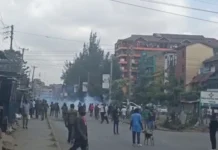Nairobi Governor Johnson Sakaja now claims that there are organized cartels trafficking children to work as hawkers in the Nairobi Central Business District.
Speaking at a local radio station on Wednesday, September 17, 2025, Sakaja revealed disturbing details about child exploitation networks operating in the capital, involving foreign nationals who are forced into street vending by criminal syndicates.
“In as much as we have children’s home, we still have an issue. I’m trying to work with the National Police to solve the problem because these children don’t like being out there,” Sakaja noted.
Sakaja cited a specific case involving a 13-year-old Burundian boy who was selling groundnuts in the CBD when he was assaulted. The Governor said he personally intervened to rescue the child, but discovered the extent of the trafficking operation.
“If you remember a case we had a while back with a kid who was assaulted while selling groundnuts? He was not even Kenyan. He was a 13-year-old Burundian. So, I looked for him and took him in as mine, so I can care for him, but in such a case, he refused to go back to school because he can’t even understand English,” he explained.
According to Sakaja, the rescued child was part of a larger criminal network where trafficked minors were expected to hand over substantial amounts of money to their handlers. The boy was reportedly required to provide KSh 2,000 monthly to individuals based in Kawangware who controlled his movements and earnings.
The governor emphasized that the issue extends beyond local street families and involves international elements that require coordination with national government agencies and foreign affairs authorities to be addressed effectively.
“I’m also trying to get the street families a better life. I’m collaborating with the Kenya National Police and the Ministry of Foreign Affairs because some families and children are not even Kenyan.”
He also indicated that his administration is working closely with the Kenya National Police and the Ministry of Foreign Affairs to tackle the cross-border nature of the trafficking networks, particularly since many of the affected children are foreign nationals.
“So the biggest issue is not getting rid of street families. The bigger issue concerns security. It’s a diplomatic issue that we must involve the national government in solving.”
During the same interview, Governor Sakaja explained his administration’s recent crackdown on informal vendors operating tent structures in the CBD, linking it to broader efforts to restore order in the capital.
The Governor described how the uncontrolled proliferation of makeshift tent structures, particularly those used for selling mobile phones and other merchandise, had become problematic and was undermining the city’s appearance.
He indicated that these informal setups lacked proper organization and were creating an unsightly environment in the capital.
The county administration has indicated plans to establish designated areas where such businesses can operate in a more structured manner, rather than allowing the random placement of vendor tents throughout the business district.



















